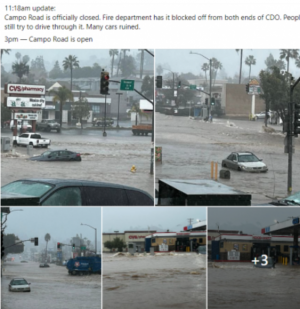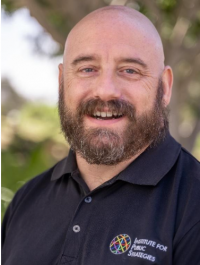 By David R. Shorey, East County Program Director, Institute for Public Strategies
By David R. Shorey, East County Program Director, Institute for Public StrategiesApril 9, 2024 (San Diego) -- On January 22, 2024, floods displaced more than a thousand San Diego County residents and severely damaged thousands of homes. Many affected were East County residents, with parts of Spring Valley and Lemon Grove hit hardest. In the wake of a disaster like this, it's not uncommon for individuals to turn to alcohol, prescription medications, or other substances as a means of coping. The upheaval, stress, and trauma triggered by such events can lead some to seek solace in these substances, believing they provide an escape from the turmoil. What may seem like a reprieve can quickly spiral into a long-term struggle, exacerbating existing problems and creating new ones.
The aftermath of a traumatic event often brings about heightened anxiety, depression, muscle tension, and sleep disturbances, driving some to self-medicate with alcohol or drugs. While these substances may seem to offer temporary relief, they ultimately disrupt natural sleep cycles, jeopardize physical health, strain relationships, and pave the way for dependence and addiction.
 It's crucial to recognize the potential pitfalls of increased substance use in the aftermath of a disaster by being vigilant and proactive in managing bad habits. We can take several practical steps to help navigate this challenging terrain. Start with self-awareness and monitoring. Pay close attention to any changes in your alcohol or drug consumption patterns. Reflect on whether your usage has escalated since the flood and consider its impact on your life. Seek professional guidance by consulting with healthcare professionals to explore safe and effective ways of addressing anxiety, depression, and other stress-related symptoms. Utilize prescribed medications judiciously and adhere to recommended dosage guidelines.
It's crucial to recognize the potential pitfalls of increased substance use in the aftermath of a disaster by being vigilant and proactive in managing bad habits. We can take several practical steps to help navigate this challenging terrain. Start with self-awareness and monitoring. Pay close attention to any changes in your alcohol or drug consumption patterns. Reflect on whether your usage has escalated since the flood and consider its impact on your life. Seek professional guidance by consulting with healthcare professionals to explore safe and effective ways of addressing anxiety, depression, and other stress-related symptoms. Utilize prescribed medications judiciously and adhere to recommended dosage guidelines.If you find yourself struggling to control your alcohol or substance use, don't hesitate to seek assistance. Lean on family, friends, and support networks for encouragement and guidance. Remember, you're not alone in this journey. Invest in your physical and mental well-being by adopting healthy lifestyle habits. Maintain a balanced diet, exercise regularly, prioritize adequate sleep, and leverage social connections for emotional support. If you suspect that you're grappling with substance misuse problems, don't delay in seeking professional help. Contact your doctor or counselor to initiate a dialogue about your concerns and explore potential treatment options.
 For those who have existing mental health or substance use problems, the aftermath of a disaster poses unique challenges and triggers. When that happens, increase participation in substance abuse support groups and engage in open conversations with loved ones about the importance of abstaining from alcohol or drugs. Communicate openly with counselors or sponsors about any struggles or temptations after the disaster. Explore avenues for accessing support groups in new or relocated communities. Exercise patience and empathy toward setbacks or relapses. Recognizing that recovery is a process. Encourage resilience and perseverance in navigating these hurdles.
For those who have existing mental health or substance use problems, the aftermath of a disaster poses unique challenges and triggers. When that happens, increase participation in substance abuse support groups and engage in open conversations with loved ones about the importance of abstaining from alcohol or drugs. Communicate openly with counselors or sponsors about any struggles or temptations after the disaster. Explore avenues for accessing support groups in new or relocated communities. Exercise patience and empathy toward setbacks or relapses. Recognizing that recovery is a process. Encourage resilience and perseverance in navigating these hurdles.If you suspect that a friend or family member is grappling with substance abuse issues, approach the situation with empathy and tact. Offer non-judgmental support and encourage them to seek professional help. Refrain from enabling behaviors and prioritize their safety and well-being. As we rebuild and recover from the recent floods in East County, let's not overlook the importance of addressing the mental health challenges accompanying such disasters. By encouraging resilience, seeking support, and prioritizing self-care, we can emerge more vigorous and united from adversity. Let's navigate these turbulent waters with compassion, determination, and resolve.
 Photo, right: David R. Shorey, IPS East County Program Director
Photo, right: David R. Shorey, IPS East County Program DirectorThe Federal Emergency Management Agency worked with the State, the County and the City of San Diego to set up a Disaster Recovery Center at the Spring Valley County Library at 836 Kempton St. and the City’s Mountain View Community Center. The recovery centers are open from 10 a.m. to 7 p.m. seven days a week through April 19, 2024. Residents impacted by the storms can register with FEMA for federal assistance and disaster loans. The centers offer information from the U.S. Small Business Administration, state agencies and the County of San Diego. Residents can also go online at DisasterAssistance.gov, use the FEMA mobile app or call the FEMA Helpline at (800) 621-3362 from 7 a.m. to 10 p.m. daily. The County also offers additional resources at AlertSanDiego.org/Recovery.
----------------------
 IPS works alongside communities to build power, challenge systems of inequity, protect health, and improve quality of life. IPS has a vision for safe, secure, vibrant and healthy communities where everyone can thrive. To learn more about IPS East County, follow us on our social media platforms: IPS East County Facebook, IPS East County X, and East County Youth Coalition Instagram. Our website is at IPSEast.org. Resources and services are available to assist with screening, treatment, and recovery for individuals with a substance use disorder via the Access & Crisis line, which is open year-round, 24/7 at (888) 724-7240 or just dial 988.
IPS works alongside communities to build power, challenge systems of inequity, protect health, and improve quality of life. IPS has a vision for safe, secure, vibrant and healthy communities where everyone can thrive. To learn more about IPS East County, follow us on our social media platforms: IPS East County Facebook, IPS East County X, and East County Youth Coalition Instagram. Our website is at IPSEast.org. Resources and services are available to assist with screening, treatment, and recovery for individuals with a substance use disorder via the Access & Crisis line, which is open year-round, 24/7 at (888) 724-7240 or just dial 988.










Recent comments